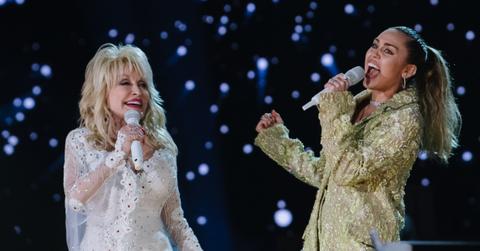
Source: Getty Images
For many music fans, Dolly Parton and Miley Cyrus is a welcomed link-up that has proven time and time again to deliver something truly special. The pop sensation and her godmother, one of the most legendary singers of all time, are a true force behind the microphone together. That notion was never more evident than when the duo dropped their inspiring collaboration “Rainbowland” back in 2017.
Article continues below advertisement
The song and its messages of inclusion have long resonated with fans, but apparently some aren’t too happy with the points that Dolly and Miley make on “Rainbowland.” That’s why in 2023, a Wisconsin school district has seemingly banned the song outright. So, what does “Rainbowland” mean, and why was it banned? Keep reading to find out.

Source: Getty Images
Article continues below advertisement
What is the meaning of Miley Cyrus and Dolly Parton’s “Rainbowland”?
The vibes are as high as can be on Miley and Dolly’s 2017 hit collaboration “Rainbowland.” Serving as a part of the former’s colorful album “Younger Now,” “Rainbowland” is all about Miley thriving within her dream world, one where she can constantly be happy and herself in a world free of judgement.
After a bubbly intro where Dolly seems to be making a phone call to Miley, the song starts off with the two harmonizing about “Livin’ in a rainbowland / Where everything goes as planned.” However, Miley and Dolly aren’t looking for some far-off planet to house “Rainbowland,” they want to make the neccesary changes on Earth to turn it into their idea of paradise.
Article continues below advertisement
Singing, “‘Cause I know if we try / We could really make a difference in this world,” the two artists are convinced that they can make the changes needed to bring “Rainbowland” to reality. The thought seems to be so powerful that they add, “I won’t give up or sleep a wink / It’s the only thought I think.” Furthermore, the two drive the point home more by singing, “You know where I stand,” insinuating their joint belief for acceptance at all levels.
Article continues below advertisement
The singers have more than put their money where their mouths are in that regard over the years. Dolly has supported gay marriage publicly since 2009 and famously denounced anti-LGBTQ+ Christians during an interview with Billboard. Likewise, Miley is openly gender fluid, pansexual, and is the founder of the Happy Hippy Foundation, which supports homeless women and LGBTQ+ youth.
The song’s messages of acceptance and tolerance continue in the chorus, where the two implore that in “Rainbowland,” “you and I go hand in hand.” They recognize that “All the hurt and the hate going on here (It needs to stop here),” referring to modern society as a whole. Instead of feuding over our differences, Miley and Dolly remind us that “We are rainbows, me and you / Every color, every hue.”
Article continues below advertisement
All-in-all, the twosome dream of a world “where we’re free to be exactly who we are.” They implore their listeners to “dig down deep inside / Brush the judgment and fear aside / Make wrong things right / And end the fight.'” In this battle for acceptance, the star’s remind us that if we stick to constant conflict instead of acceptance, “ain’t nobody gonna win.”
Article continues below advertisement
Why was “Rainbowland” banned in a Wisconsin school district?
With a song as upbeat and accepting as “Rainbowland,” one would assume that it would be pretty hard to find flaws in it. However, a school board representing Heyer Elementary School in Waukesha, Wiss., seems to have taken serious issue with the track, going as far as banning it within their institution.
Per the Los Angeles Times, a local resident named Sarah Schindler told the publication that her first grade daughter shared how Heyer Elementary School’s spring concert initially included song selections such as “Rainbowland” as well as “Rainbow Connection” by Jim Henson that year. Within days though, the youngster updated her mother with the news that the school had banned both songs.
Article continues below advertisement
Sarah told the publication that her local school board experienced “a conservative flip” recently.
“With that have come some policy changes that have been causing some controversy in our community,” she explained. “One of those is a controversial topics policy saying that teachers can’t have any kind of signage that could be deemed political. Discussion of pronouns with students was another thing that came up. And teachers aren’t allowed to wear rainbows.”
Article continues below advertisement
Those sentiments were echoed by Melissa Tempel, Sarah’s daughter’s first grade teacher at Heyer Elementary School. On March 21, 2023, she tweeted, “My first graders were so excited to sing ‘Rainbowland’ for our spring concert but it has been vetoed by our administration. When will it end?”
During a 2017 interview with NME, Miley shared her goal behind creating “Rainbowland.” She explained, “It [the song] says, ‘We are rainbows, me and you / Every color, every hue.’ And it’s about all these different races and genders and religions, if we all did come together to create and said, ‘Hey, we’re different; that’s awesome! Let’s not change to be the same. Let’s stay different but let’s come together anyway.’ Because a rainbow’s not a rainbow without all the different colors.”
Despite Miley and Dolly having good intentions at heart in releasing “Rainbowland,” the song doesn’t seem to be resonating with people in all circles. Nonetheless, given both stars’ outspoken history of support for inclusion of all races, genders, and walks of life over the years, it’s unlikely that they’ll be backing down from their views anytime soon.
Source: https://www.distractify.com/p/rainbowland-miley-cyrus-dolly-parton-meaning
